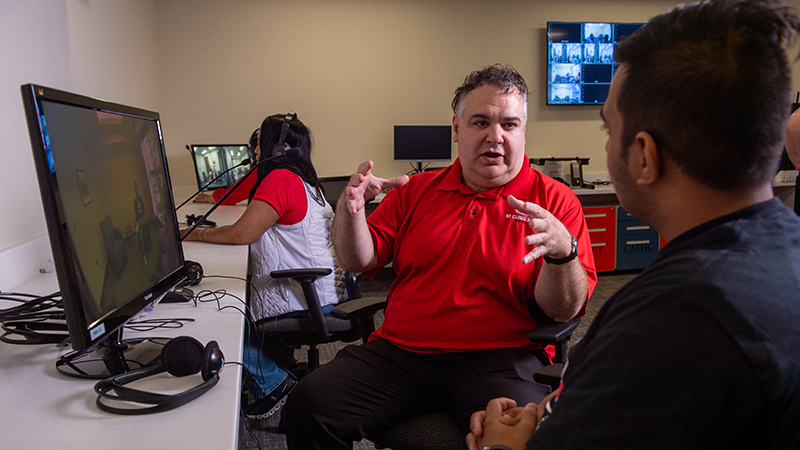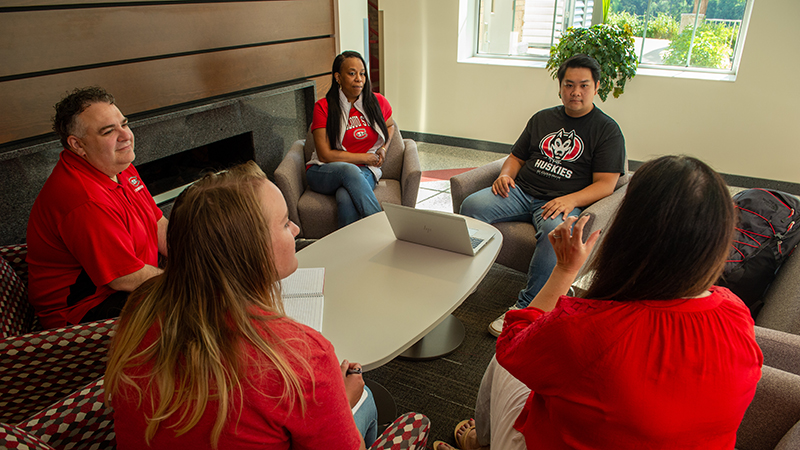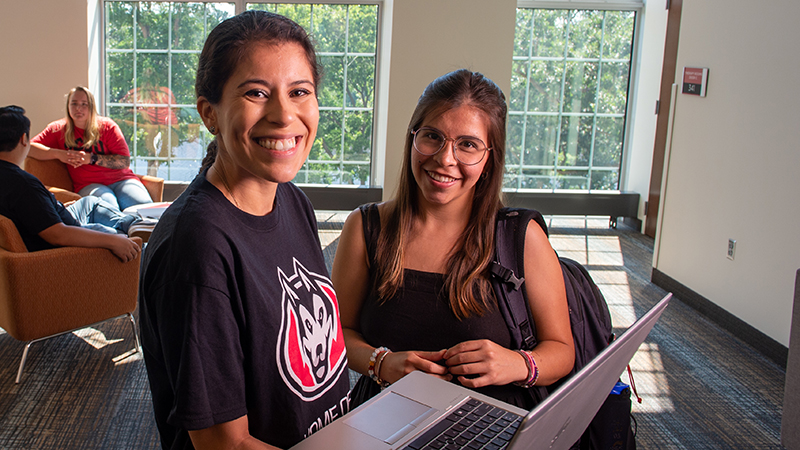Clinical Mental Health Counseling
Master of Science
Clinical Mental Health Counseling at SCSU
The Clinical Mental Health Counseling program mission is to inspire future mental health counselors who are passionate about pursuing the highest standard of clinical practice with cultural fluency.
Our mission is dedicated to achieve the following outcomes:
- Cultural Responsiveness & Ethics: students will demonstrate cultural fluency, trauma-informed awareness, and ethical decision-making across diverse contexts.
- Evidence-Based & Developmentally Appropriate Practice: all students will demonstrate the ability to apply evidence-based, holistic counseling strategies to support growth in personal, social, academic, relational, and career domains.
- Communication & Counseling Relationships: all students will demonstrate the ability to communicate effectively and build strong, supportive counseling relationships with clients, students, families, and communities.
- Collaboration & Advocacy: all students will demonstrate the ability to collaborate with interdisciplinary professionals, educators, and systems to foster resilience, equity, and optimal development.
- Innovation, Leadership & Professional Identity: all students will demonstrate the ability to integrate research, technology, leadership, and advocacy into professional practice to meet evolving mental health and educational needs.
Quick Links
Program Accreditation
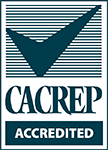 The Clinical Mental Health Counseling program at St. Cloud State University engages in an array of data gathering activities to improve its program. Comprehensive Program Plan for the Clinical Mental Health Counseling Program at SCSU addresses both the continuous systematic program evaluation processes as well as the assessment of student learning outcomes processes. The assessment plan is detailed at both the curricular experiences and overall program level in relation to assessing direct evidence of student learning. The accreditation runs through October, 2026.
The Clinical Mental Health Counseling program at St. Cloud State University engages in an array of data gathering activities to improve its program. Comprehensive Program Plan for the Clinical Mental Health Counseling Program at SCSU addresses both the continuous systematic program evaluation processes as well as the assessment of student learning outcomes processes. The assessment plan is detailed at both the curricular experiences and overall program level in relation to assessing direct evidence of student learning. The accreditation runs through October, 2026.
In-site Menu
Program Highlights
projected employment growth
of graduates employed
students hired by the organization where they complete their internship
In-demand Occupation
According to the occupational outlook employment for mental health counselors is projected to grown by 19% from 2023-2033, much fast than the average for all occupations.
According to the SCSU Career Center, 100% of recent graduates of this program are employed within one year of graduation with an average starting salary upwards of $65,000.
Start your professional development now by becoming affiliated with one of these organizations:
American Counseling Association
National Board for Certified Counselors
Minnesota Counseling Association
Program Features
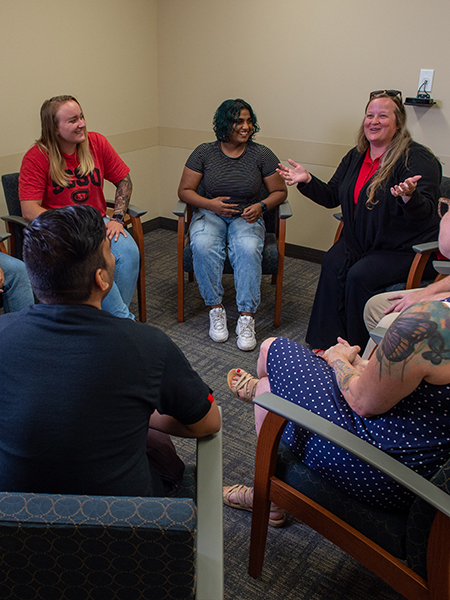 Our faculty members employ a variety of applied learning and instructional methods.
Our faculty members employ a variety of applied learning and instructional methods.
We require extensive clinical training, with an emphasis in social justice and cultural fluency. Students are trained to integrate those practices in their work with individual, family and group counseling.
Our students' experiences include:
- Three-semester practicum in individual and advanced group counseling which is unique in the region
- Live-supervised in-house practicum training
- Hands-on approach learning in all courses
- Students currently serve as an overflow for our Counseling & Psychological Services (CAPS) at the University.
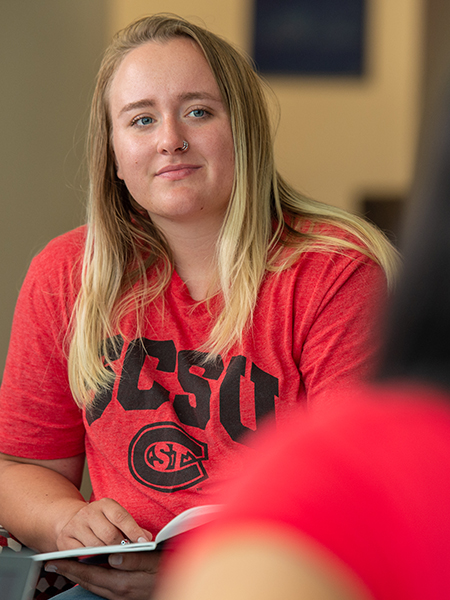 Our program emphasizes strength-based models of human development from a culturally competent lens. The faculty incorporate a variety of theoretical approaches including classical and contemporary counseling theories, systemic frameworks, multicultural and social justice perspective that align to Association for multicultural Counseling 7 Development (AMCD) – multicultural & social justice counseling competencies. Students gain experience in mindfulness-based approaches, integrated health, holistic wellness and prevention models.
Our program emphasizes strength-based models of human development from a culturally competent lens. The faculty incorporate a variety of theoretical approaches including classical and contemporary counseling theories, systemic frameworks, multicultural and social justice perspective that align to Association for multicultural Counseling 7 Development (AMCD) – multicultural & social justice counseling competencies. Students gain experience in mindfulness-based approaches, integrated health, holistic wellness and prevention models.
Unique program strengths:
- Faculty are trained in motivational interviewing, mindfulness-based stress reduction, PREPARE/ENRICH couples work, and in eye movement desensitization and reprocessing.
- Faculty have competencies in culturally fluent pedagogy and clinical practice.
- Students are trained in evidence-based therapies that align with the DSM-5/ICD-10 classification.
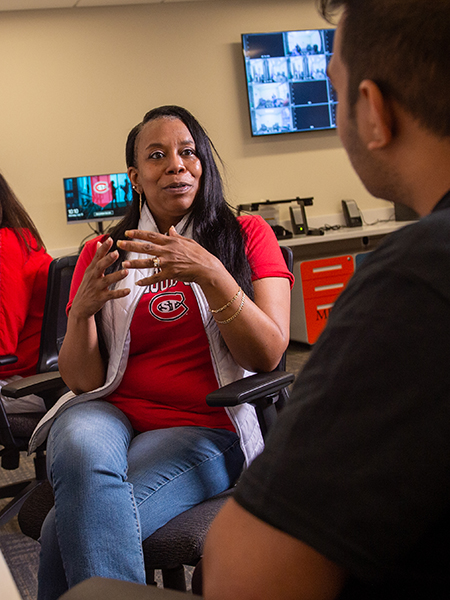 Our program instills the knowledge, concepts, and skills of trauma-informed therapy in our students’ learning and clinical training. Our faculty continue to advance in the trauma-informed therapy to better prepare our students for future challenges in trauma work.
Our program instills the knowledge, concepts, and skills of trauma-informed therapy in our students’ learning and clinical training. Our faculty continue to advance in the trauma-informed therapy to better prepare our students for future challenges in trauma work.
- Faculty are currently collaborating with CentraCare and Stearns County with the Trauma Informed Care Program called Adverse Childhood Experiences. (ACE)
- Faculty have training in eye-movement desensitization and reprocessing, trauma-focused cognitive behavioral therapy, dialectical behavior therapy, prolonged exposure therapy, etc.
- Faculty are involved in scholarly work related to crisis and trauma work with children, adults and couples
- Faculty are involved in trauma training to prepare clinicians who will work with trauma in refugee populations.
- We instill knowledge and clinical skills of trauma-informed therapy in student learning
- Faculty are certified in the question, persuade, refer (QPR) method and provide training to students in suicide prevention
- Faculty are certified in Mental Health First Aid (MHFA) to provide services to individuals in needs
- Faculty receive training in Trauma-Focused Cognitive Behavior Therapy (TF-CBT)
- We incorporate advances in neuroscience and attachment theories
- Students are trained in trauma work, which focuses on:
- culturally informed practices with communities of color, refugee, immigrant, and LGBTQ population
- sexual trauma (childhood sexual abuse, rape, secondary trauma as it relates to boarder violence, and military sexual trauma)
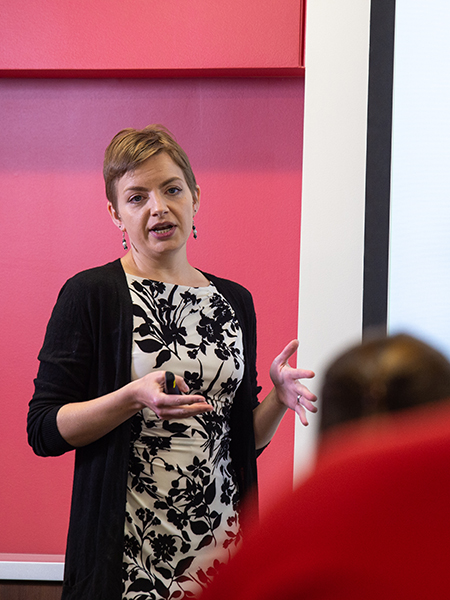 Our courses are well designed for didactic and applied learning. In the classroom, students will explore situational factors, address learning goals for each course that meet CACREP and licensure board standards, and receive assessment results at several points throughout each course. An evidence-based course design, developed by Dr. Dee Fink, has been adopted to guide the program course design and to promote significant learning in Clinical Mental Health Counseling (CMHC) training.
Our courses are well designed for didactic and applied learning. In the classroom, students will explore situational factors, address learning goals for each course that meet CACREP and licensure board standards, and receive assessment results at several points throughout each course. An evidence-based course design, developed by Dr. Dee Fink, has been adopted to guide the program course design and to promote significant learning in Clinical Mental Health Counseling (CMHC) training.
Integrated course design (ICD) exposes students to a variety of learning activities that enhance the integration of material from the classroom into applied clinical practice.
Integrated course design includes:
- Students read course content materials and video learning before class meeting.
- Students apply course content through experiential learning during class time.
- Students participate in collective assessment formats and team-based learning.
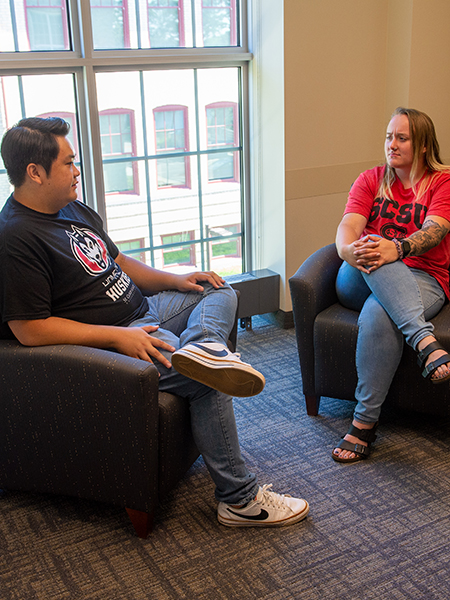 We have developed a supportive network of community partnerships, where students can excel in clinical skills training, program development, social justice advocacy, cultural fluency and agency consultation.
We have developed a supportive network of community partnerships, where students can excel in clinical skills training, program development, social justice advocacy, cultural fluency and agency consultation.
Students work alongside faculty to integrate classroom knowledge into their experiences. Recent partnerships include:
- Neighborhood Involvement Program (N.I.P.) – Students participated in revising group programing to meet trends in trauma-informed care with survivors of sexual trauma.
- Catholic Charities (La Cruz) – Students participated in service learning activities with children from diverse cultural backgrounds. Students directed skills-based groups, participated in the grant writing process and developed training video on basic counseling skills to prepare future site mentors.
- SCSU Counseling and Psychological Services – Students participated in prevention-based educational materials and training for the campus community on various mental health issues.
- Mental Health First Aid training - Students participated in this cross-campus (SCSU and St. Paul College) project to receive training in MHFA.
